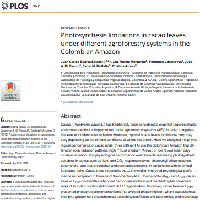Resumen
- Cacao (Theobroma cacao L.) has traditionally been considered a crop that requires shade, and consequently it is implemented under agroforestry systems (AFs) in order to regulate the level of incident solar radiation. However, optimal shade levels for this tree crop may vary depending on the climate conditions of where it is grown. Here we analyzed the physiological performance of cacao under three different AFs in the Colombian Amazon that differed in solar radiation patterns: high (HPAR), medium (MPAR), or low (LPAR) mean daily incident radiation. The physiological performance was characterized using photosynthetic variables in leaves such as light- and CO2-response curves, chlorophyll a fluorescence parameters, and total chlorophyll and carotenoid contents, in conjunction with other leaf functional traits. Cacao trees exposed to HPAR showed an improved physiological performance as compared to those from the other two AFs. Compared to MPAR and LPAR, cacao trees in HPAR doubled the rate of net carbon assimilation and reached higher maximum rates of RuBisCO carboxylation and RuBP regeneration. Moreover, cacao trees in HPAR presented photoprotection mechanisms that avoided photoinhibition, which was accompanied by a greater non-photochemical quenching coefficient and biochemical and morphological adjustments (low chlorophyll but higher carotenoid contents and low specific leaf area) compared to cacao trees from the other AFs. Overall, our results show that, due to the high cloud cover in the Colombian Amazon, cacao plantations under conditions of sparse shade maximized their carbon use, showing an improved physiological performance as a result of higher photosynthetic rates and energy dissipation mechanisms. If the crop were managed with sparse shade, the paradigm that favors the cultivation of cacao under shade would be called into question in the Colombian Amazon and other regions with similar climatic conditions.
